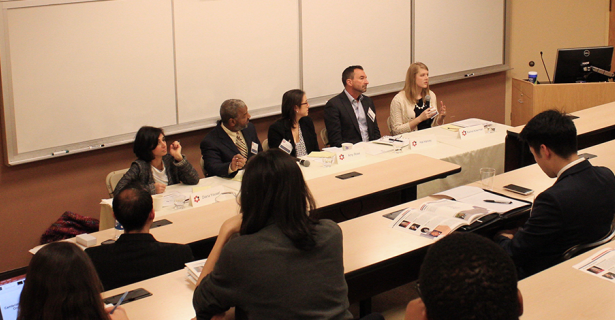On Saturday, February 11th, nearly 300 energy professionals and students gathered to participate in the 12th annual Tufts Energy Conference (TEC). The theme of TEC 2017 was Innovation for Global Energy Access. Through nine panel discussions and one keynote address, all of which explored various dimensions of the conference theme, 40 expert speakers contributed their insights on how innovation can and must be harnessed to improve and expand global energy access.
The day’s discussion began with Dr. Linda Abriola, Director of the Tufts Institute of the Environment, opening the conference with an overview of the innovative work members of the Tufts community are doing in the energy sector. Dr. Abriola also shared a personal account of her encounter with energy poverty in Nepal during her visit to the country in 2016 as a US Department of State Science Envoy.
The panel discussions began immediately following Dr. Abriola’s remarks. The nine panels were organized along three tracks: Policy & Regulation, Partnerships & Funding, and Technological Innovation.
Within the first track, experts discussed the variety of policy innovations that could comprise the mix required to move towards expanded energy access. The three panel discussions within this track were framed by different scopes and contexts, ranging from one weighing the priorities of the new US administration and resulting implications for national energy policy, to another focused on the utilization of renewable energy in indigenous communities in the US and Canada, and the powerful ripple effects of such projects. The final panel in this track was a discussion on the ways in which local and regional regulatory systems must collaborate to find synergies and enhance the benefits made possible through more advanced and resilient energy systems.
The second track on Partnerships & Funding highlighted structural and financial innovations that will be critical to furthering energy access goals. In the first panel, entitled ‘Cross-Sector Partnerships: Finding Common Ground with Multiple Stakeholders’, experts from a diverse range of backgrounds shared their insights from working through various forms of partnerships on why this structural model will be essential to moving towards an improved energy future more expediently, as it fosters discourse and collaboration across sectors, allowing for knowledge sharing and - ideally - improved harnessing of efficiencies and competitive advantages. The second and third panels in this track discussed, respectively, the “Institutional Obstacles to Financing Energy Access Projects,” from the perspective of more traditional, commercial funding sources, and the crucial role to be played by “Creative Financing & Entrepreneurship for a Better Energy Future.”
The third track on Technological Innovation drew out conversations and perspectives on complicated challenges and solutions inherent in applying advanced technologies to expand energy access around the globe. The first set of panelists in this track debated the merits of deploying advanced technologies as they are now (and within the context of energy systems as they currently exist in different forms around the world), as opposed to waiting and innovating further to develop technologies and systems that might be more efficient and effective in the future. A second panel on the energy-water nexus highlighted the intertwined nature of humankind’s relationship with these two scarce resources and how improved technologies can aid in more efficient allocation of these resources and reducing our global water and carbon footprints. Finally, a discussion on “Distributed Energy Solutions Driving Electrification” expanded on the range of technologies and products currently available, and how differing energy needs and contexts around the world necessitate thoughtful assessments of which technologies would be best deployed in various locales to foster expanded energy access and electrification.
Kristina Skierka, Campaign Director of Power for All, closed the day’s discussion with a powerful keynote address highlighting the barriers to energy access around the world and the critical role that advanced, clean energy technologies must play in order for these barriers to be overcome and for the energy access gap to be closed. It is through the deployment of such technologies - via decentralized systems and alongside innovative, inclusive payment models - that Power for All aims to achieve universal energy access five years ahead of the schedule set by the United Nation’s Sustainable Development Goal 7.
Another exciting part of the day was the Energy Innovation Competition, during which the winner was announced, and presentations from the winning and finalist teams were given. The competition is designed to support students in devising and implementing projects that explore solutions to key energy issues, inspire interdisciplinary research and collaboration, and provide greater visibility of Tufts engagement in energy-related disciplines. This year’s winning team, Cambridge Crops, pioneered an edible “skin” for fruits and vegetables that prevents spoiling, thereby reducing waste of food, as well as the emissions associated with food production and distribution.
The Tufts Energy Conference is an annual event that brings together professionals, students, and experts from the private, public, and nonprofit sectors to discuss critical global energy issues. The conference is organized entirely by students from a broad range of backgrounds including engineering, international affairs, urban planning, and economics. This diversity of backgrounds from across the Tufts community is perhaps the most crucial aspect in allowing the conference to achieve such strongly interdisciplinary conversations on today’s most pressing global energy challenges - all of which are extremely complicated and will therefore require dynamic, interdisciplinary thinking and solutions to be effectively resolved. TEC is the biggest student-run conference that takes place at Tufts University. From a two-panel event in 2006, TEC has grown into one of the largest entirely student-run energy conferences in the region, attracting as many as 400 attendees each year.

